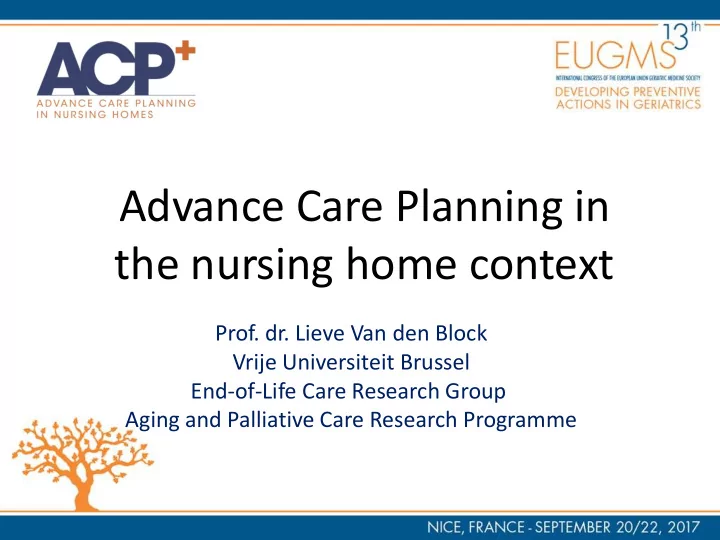

Advance Care Planning in the nursing home context Prof. dr. Lieve Van den Block Vrije Universiteit Brussel End-of-Life Care Research Group Aging and Palliative Care Research Programme
CONFLICT OF INTEREST DISCLOSURE I have no potential conflict of interest to report I thank the support of the Maruzza Foundation for co- hosting this session
What is Advance Care Planning? ACP
Lancet Oncolgy 2017 Rietjens et al “the ability to enable individuals to define goals and preferences for future medical treatment and care, to discuss these goals and preferences with family and health-care providers, and to record and review these preferences if appropriate”
Communication process Not just about filling in advance directices or living wills Early enough For when people become incapacitated but also to allow people time to thing about and prepare for future decision-making With patient, family, professionals
Available guidelines for ACP conversations • International articles • Country specific guidelines for professionals (evidence- and consensus-based) • Information campaigns
Mullick et al 2013 BMJ
What are core themes in ACP communication? • Information preferences • Disease and prognoses awareness • Broader values of the person, views on quality of life • Experience of the present and fears about the future and the end of life • Future care goals • Specific advance decisions about the end of life Conversations can follow a staged approach but not necessarily – depends on the person!
ACP Research
Booming research area since the 1990s Prevalence studies Qualitative studies Intervention studies What have we learned so far?
1. Increase in use of advance directives 2. Still initiated too late – eg in dementia, mainly with family 3. Interventions are not succesfull if reduced to filling in documents
SUPPORT Trial 1995 US Intervention study 4000 patients randomized to usual hospital care or SUPPORT intervention (nurse led communication, documentation of preferences) NO intervention EFFECT but it shook the medical world
1. Increase in use of advance directives 2. Still initiated too late – eg in dementia, mainly with family 3. Interventions are not succesfull if reduced to filling in documents 4. ACP can have positive patient and family outcomes
2010 Australia Respecting patient choices ACP programme
1. Increase in use of advance directives 2. Still initiated too late – eg in dementia, mainly with family 3. Interventions are not succesfull if reduced to filling in documents 4. ACP can have positive patient and family outcomes 5. Implemention of ACP in practice is difficult
ACP policy in nursing homes established 100 90 uitsluitend patiënt-specifieke documenten richtlijnen + patiënt-specifieke documenten 80 % rust- en verzorgingstehuizen† uitsluitend richtlijnen 70 60 50 40 30 20 10 0 1988 1989 1990 1991 1992 1993 1994 1995 1996 1997 1998 1999 2000 2001 2002 2003 2004 2005 2006 Implementatiejaar De Gendt et al Eur J Public Health. 2010 Apr;20(2):189-94.
Importance of ACP acknowledged Yes, … but changing practice appears very difficult, training communication skills is not enough Implementation programmes needed that take into account context and change management
PHASE 1 DEVELOPING ADVANCE CARE PLANNING INTERVENTION IN NURSING HOMES THEORY OF CONTEXTANALYSIS CHANGE MAP & STAKEHOLDER = WORKSHOPS SYSTEMATIC H° CAUSAL REVIEW PATHWAY
preconditions at multiple levels: resident, family staff of different levels, volunteers, GPs/physicians management and NH structure
FROM STAKEHOLDERS WORKSHOPS TO THEORY OF CHANGE MAP
Addressing multiple levels to achieve ACP outcomes What are the logical steps (preconditions) that need to be achieved?
PHASE 2 FEASIBILITY AND ACCEPTABILITY TESTING GROUP MATERIAL REVIEW BY DISCUSSION INDIVIDUAL INTERVIEWS WITH MANAGERS, EXPERIENCED TRAINER WITH STAFF HEAD NURSES, RESIDENT/FAMILY COORDINATORS
Intervention components linked to ToC map
External ACP trainer aiding with stepwise Intervention components implementation (8 months to one year) linked to ToC map Working with management to ensure engagement Working with leaders/coordinators to tailor and concretise the intervention components Training of ACP reference persons within the facility In-service (regular) training of staff and volunteers Regular information to GPs Regular information to residents, family ACP conversations guide and documentation system (and access) ACP follow-up part of multidisciplinary meetings Regular reflective sessions Monitoring and audit
Materials ACP+ Tools and conversation instruments ACP+ Guidance documents ACP+ training manuals
PHASE 3 NEXT STEPS OUTCOME PROCESS Cluster RCT EVALUATION EVALUATION
Key messages • There is no quick fix to a complex problem • Training in communication and ACP of staff is not enough • Nursing home context = “weak” context – Low educated staff with limited training in ACP – High staff turnover – Often lack of multidisciplinary input – Funding sometimes restricted – time pressure for staff • Nursing home context = complex context – Complex trajectories, multimorbidities, dementia – Pending death not always recognized – Length of stay becoming shorter • To ensure ACP interventions are implemented in daily practice and sustained, they need to – be tailored to the context and the individual facility – become part of routine daily responsibilities – multicomponent: target multiple interacting levels – be implemented stepwise
LVDBLOCK@vub.be Acknowledgments Joni Gilissen, MSc Lara Pivodic, Dr. Luc Deliens, Prof. Dr. Robert Vander Stichele, Prof. Dr. Chris Gastmans, Prof. Dr. Research supported by Research Foundation Flanders Session supported by the Maruzza Foundation
Recommend
More recommend